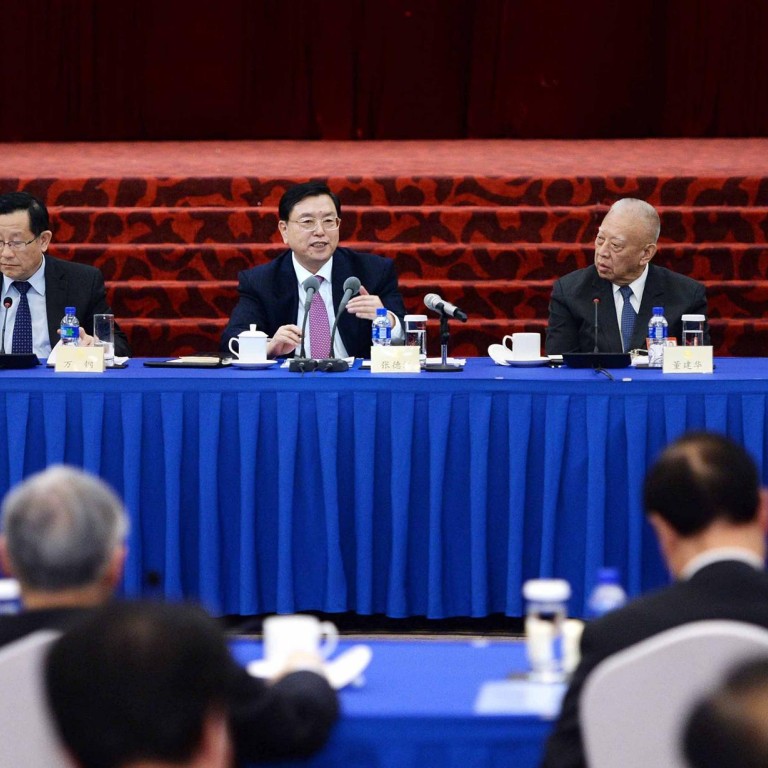
Zhang Dejiang rules out public nomination for 2017 chief executive poll
Premier Li Keqiang backs Zhang, saying Beijing will 'unswervingly' implement 'one country, two systems' principle
The mainland official in charge of Hong Kong affairs yesterday laid down the rules on the city's push to directly elect its political leader, effectively dismissing the possibility of allowing voters to put forward candidates.
Zhang Dejiang, head of the Communist Party's leading group on Hong Kong and Macau Affairs, spelt out conditions for the city's political reform to about 200 Hong Kong delegates to the annual conference in Beijing of the Chinese People's Political Consultative Conference.
It means that public or political party nomination will not be allowed
Zhang told the delegates Hong Kong must "uphold the principle of 'one country' while respecting the differences between the 'two systems'," Xinhua quoted him as saying at the two-hour closed-door meeting.
His comments were backed Wednesday by Premier Li Keqiang, who pledged that Beijing would "unswervingly" implement the principles of 'one country, two systems', and maintain the long-term prosperity and stability of Hong Kong and Macau.
Speaking at the opening of the national legislature’s yearly session this morning Li also promised to "support the chief executives and governments of the two regions in governing in accordance with the law, developing the economy, improving people’s wellbeing, advancing democracy in accordance with the law and maintaining social harmony.
"We will further increase co-operation between the mainland and the two regions and help them become more competitive," he added. "As China continues to comprehensively deepen reform and modernise, Hong Kong and Macau stand to benefit greatly."
Zhang yesterday said Hong Kong's push for democracy must be gradual and orderly. Without directly referring to the idea of public nomination - allowing voters to put forward candidates - Zhang said the reform must be done in accordance with the constitution and the Basic Law.
This was a coded way of saying all candidates must be put forward by a nominating committee - a body whose members will mostly be Beijing loyalists.
While the same message had previously been delivered by other mainland officials, Zhang represents the highest authority on Hong Kong affairs. He is also chairman of the National People's Congress.
James Tien Pei-chun, one of the CPPCC delegates, said Zhang's remarks had effectively killed off the idea of public nomination. "His message was that we must follow the Basic Law when making electoral changes.
"There can be no other interpretation of the article [in the Basic Law]. It means that public or political party nomination will not be allowed," he said.
Tien was referring to Article 45 of the Basic Law, which states that the chief executive shall be elected through universal suffrage "upon nomination by a broadly representative nominating committee in accordance with democratic procedures". But Henry Tang Ying-yen, a CPPCC Standing Committee member and former chief secretary, said Zhang "only reiterated principles". Tang said: "There was no mention of public nomination. His emphasis was on the principles of following the Basic Law [in the nominating process].
"He has stressed repeatedly that Beijing remains firmly in support of Hong Kong's [goal] to achieve universal suffrage in the next chief executive election.
"And the election must follow three principles - the foundation of the Basic Law, the decision of the NPC Standing Committee and [the need to elect] a patriot."
In 2007, the NPC Standing Committee ruled that Hong Kong could implement universal suffrage in 2017.
Zhang did not address the issue of Occupy Central - a pan-democratic movement that is urging Hongkongers to block the financial district if Beijing refuses to allow the city to have "genuine" democracy.
But in another closed-door meeting among CPPCC delegates yesterday, Yin Xiaojing, a deputy director of the central government's liaison office in Hong Kong, told delegates she "does not want to see the Occupy Central protest taking place".


